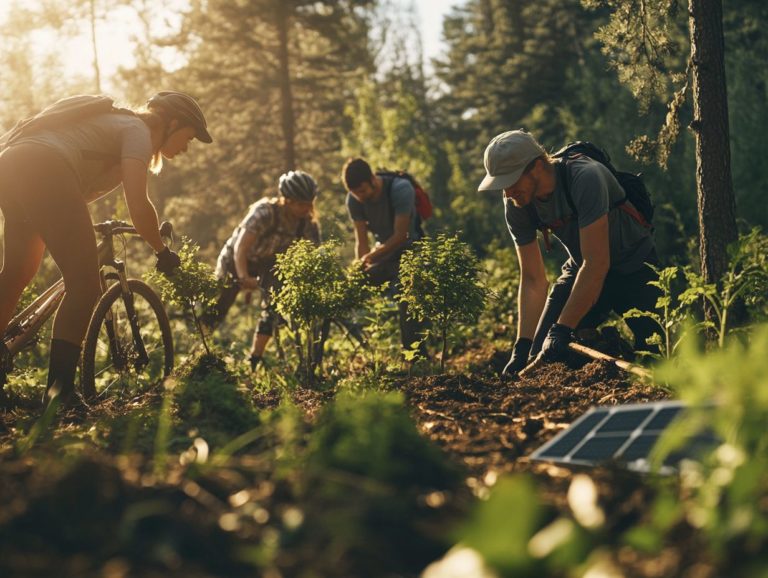Kayaking with a Cause: Eco-Conscious Water Sports
In a world that s becoming more attuned to environmental challenges, eco-conscious water sports are establishing a notable presence.
Traditional water activities often leave a substantial mark on ecosystems. Kayaking stands out as a refreshing alternative that embraces both enjoyment and sustainability.
This article delves into the benefits of eco-friendly kayaking for the environment and personal health. It offers practical tips to help you take action today to minimize your impact on the environment, along with insights into organizations dedicated to this vital cause.
Dive in now and discover how you can paddle with purpose, making a meaningful contribution to a healthier planet.
Contents
- Key Takeaways:
- The Importance of Eco-Conscious Water Sports
- Kayaking as an Eco-Friendly Water Sport
- How to Participate in Eco-Conscious Kayaking
- Organizations and Initiatives Supporting Eco-Conscious Water Sports
- The Future of Eco-Conscious Water Sports
- Frequently Asked Questions
- What is Kayaking with a Cause?
- Why is kayaking an eco-conscious water sport?
- How can one participate in Kayaking with a Cause?
- What are some eco-conscious practices to follow while kayaking?
- Can kayaking actually make a positive impact on the environment?
- Are there any risks involved in kayaking with a cause?
Key Takeaways:
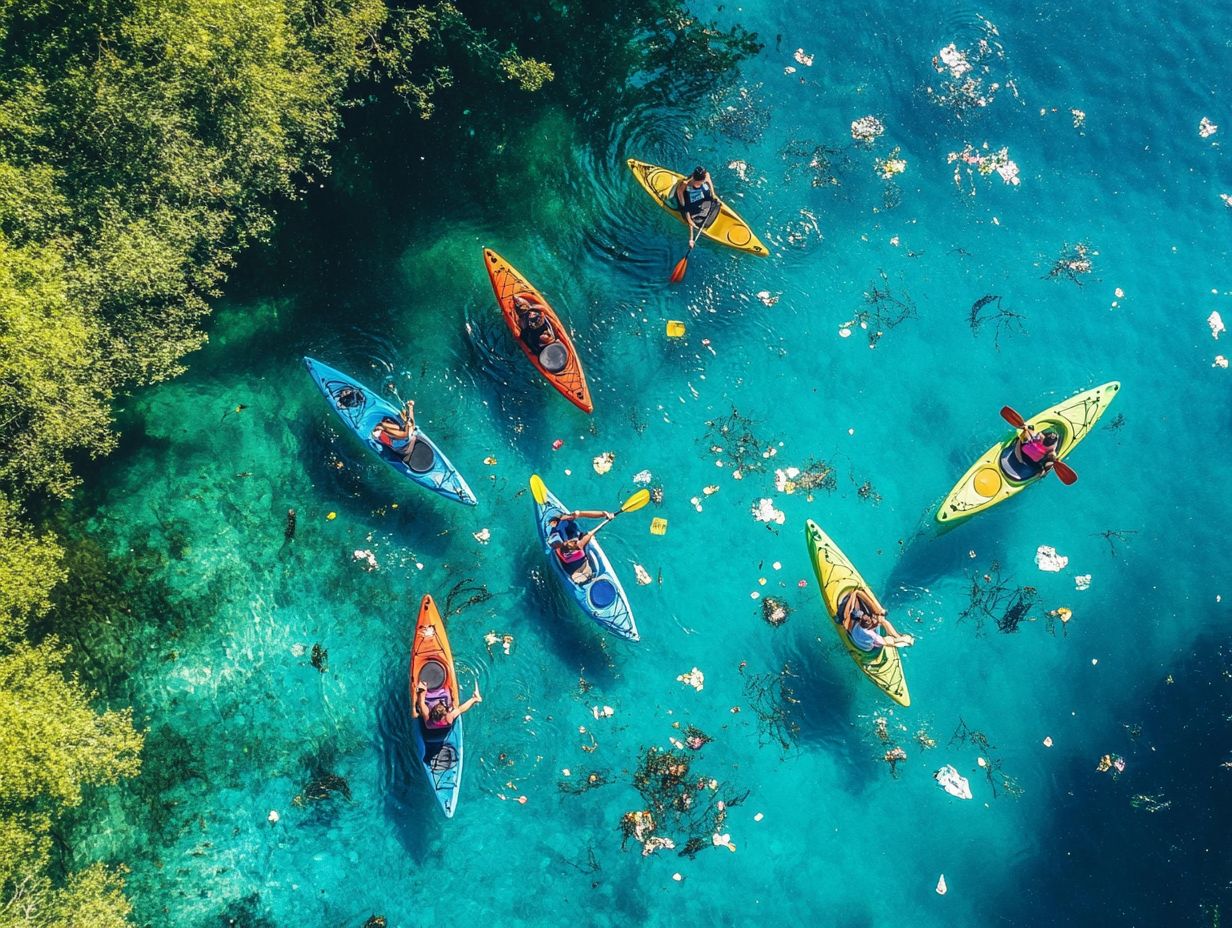
- Kayaking is an eco-friendly water sport that benefits both the environment and personal health.
- Participating in eco-conscious kayaking helps reduce the negative impact of traditional water sports on the environment.
- Support organizations and initiatives that promote sustainable practices to ensure a brighter future for eco-conscious water sports.
The Importance of Eco-Conscious Water Sports
Eco-conscious water sports are essential for preserving our delicate marine ecosystems, particularly in sensitive regions like the North Sea, Baltic Sea, and Wadden Sea.
By participating in environmentally friendly activities such as kayaking, paddleboarding, and sailing, you not only relish the stunning beauty of these areas but also play a vital role in conserving native porpoises and other wildlife.
Recognizing the significance of sustainable practices (methods that do not harm the environment) is crucial for maintaining the health of our oceans. This ensures that future generations can enjoy water sports while safeguarding nature.
Understanding the Impact of Traditional Water Sports
Traditional water sports may bring joy, but they often come with a hefty environmental cost that can jeopardize local wildlife, including native porpoises, and disrupt delicate ecosystems.
Consider the noise from motorized boats; it can throw marine creatures into disarray, interfering with their communication and mating rituals. The wake and presence of these vessels can lead to coastal erosion and habitat destruction, putting fish nurseries and aquatic plant life at risk.
Pollution from fuel spills and litter only compounds these challenges, resulting in contaminated waters that harm not just marine ecosystems but also the communities that depend on them for their livelihoods.
It’s crucial for local communities and governments to step up, implementing stricter regulations and promoting awareness about sustainable practices in water sports. By doing so, they can help safeguard vulnerable species and their habitats for future generations.
Kayaking as an Eco-Friendly Water Sport
Kayaking is one of the most eco-friendly water sports available. It offers a unique opportunity to connect with nature while keeping your carbon footprint (the total amount of greenhouse gases produced) to a minimum.
This activity provides a sustainable means to explore breathtaking landscapes and inspires you to take part in clean-up initiatives within nature reserves, helping to protect invaluable ecosystems.
As more people embrace kayaking and stand-up paddling (SUP), the advantages extend well beyond enjoyment. You become part of a growing culture of environmental stewardship and respect for our marine environments.
Benefits for the Environment
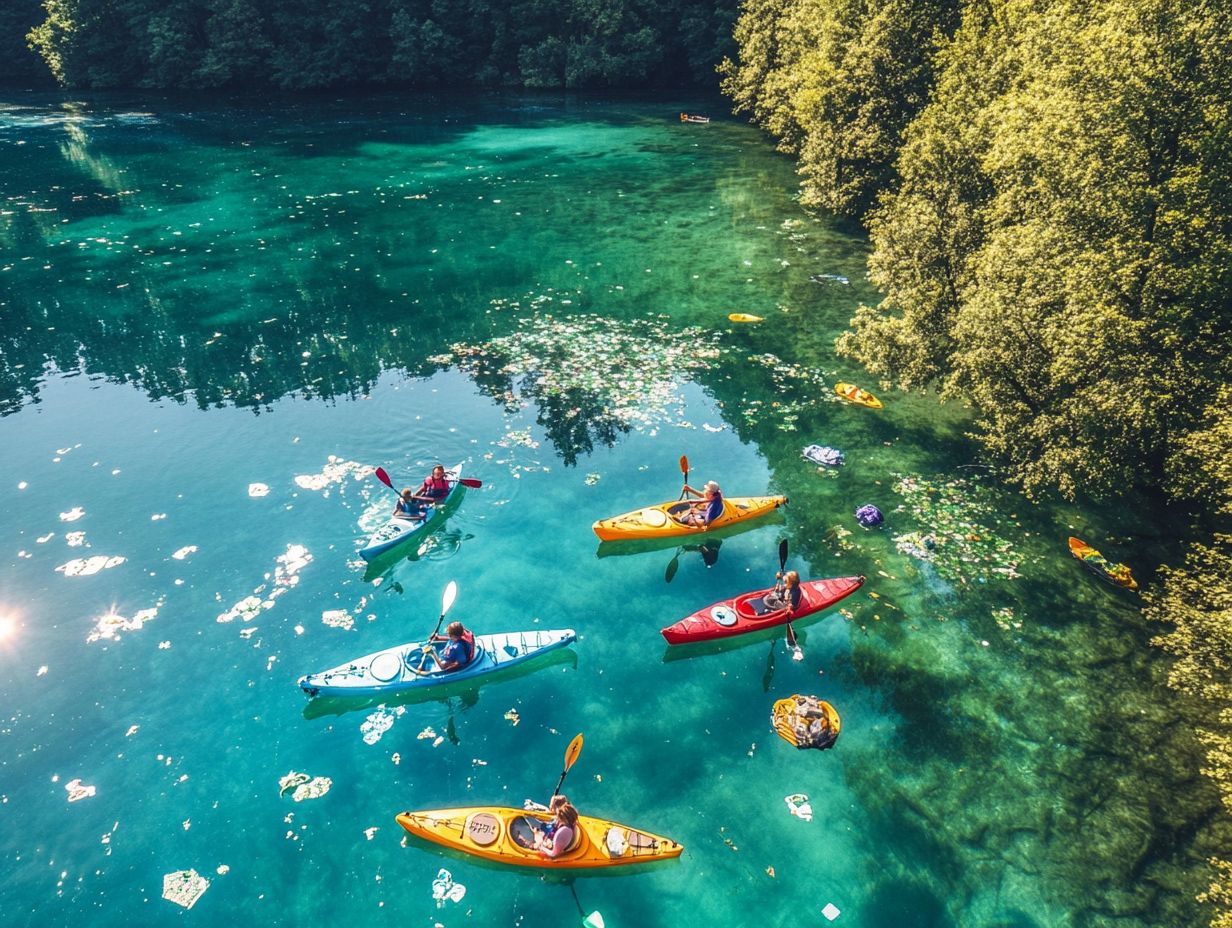
The environmental benefits of kayaking are truly remarkable. This eco-friendly water sport fosters a sense of conservation and awareness of delicate marine ecosystems.
As you glide through the water, you may find yourself evolving into an advocate for nature. You will gain a newfound appreciation for the diverse habitats that surround you. By choosing to navigate these waterways sustainably, you play a vital role in kicking pollution to the curb and contributing to cleaner lakes and rivers.
Many kayakers, like yourself, often join local clean-up events within nature reserves. You actively remove debris and pollutants that pose threats to aquatic life. This hands-on involvement deepens your connection to the environment and inspires you to adopt sustainable practices in your daily life. You help preserve vital ecosystems for generations to come.
Benefits for Personal Health
Engaging in kayaking offers you a wealth of benefits for your personal health. It s an exceptional choice for eco-conscious individuals like yourself who want to stay active while immersing in nature.
This invigorating water sport boosts your cardiovascular fitness through consistent paddling. It also enhances your overall muscle strength, targeting various muscle groups with each powerful stroke.
As you glide through tranquil waters, you ll likely find significant stress relief. The calmness of your surroundings washes away the burdens of daily life.
The rhythmic motion of kayaking brings a meditative quality that enriches your mental well-being. By embracing an eco-friendly activity like kayaking, you empower yourself to protect the environment while nurturing both your body and mind.
How to Participate in Eco-Conscious Kayaking
Engaging in eco-conscious kayaking calls for a deliberate approach that prioritizes sustainability at every turn. This includes selecting the right equipment and following local regulations designed to protect fragile habitats and wildlife.
By opting for eco-friendly gear such as biodegradable dry bags that break down naturally and sustainable paddles you can significantly lessen your environmental footprint while enjoying nature’s splendor.
This commitment enriches your experience and safeguards the joy of kayaking for future generations. You also help preserve our invaluable ecosystems.
Tips for Reducing Your Environmental Impact
Reducing your environmental impact while kayaking is entirely within your reach. You can adopt a variety of eco-conscious practices and choices to ensure your enjoyment of water sports doesn t come at the expense of nature.
Act now by choosing biodegradable products like eco-friendly sunscreen and reusable water bottles. You significantly lessen your footprint on fragile ecosystems.
Engaging in local clean-up efforts contributes to a healthier environment and fosters a sense of community among fellow outdoor enthusiasts.
Staying mindful of local regulations such as avoiding restricted areas and adhering to wildlife protection guidelines can greatly bolster conservation efforts. These actions demonstrate your commitment to preserving the natural beauty and integrity of waterways for future generations. Each kayaking adventure becomes not just enjoyable, but sustainable.
Organizations and Initiatives Supporting Eco-Conscious Water Sports
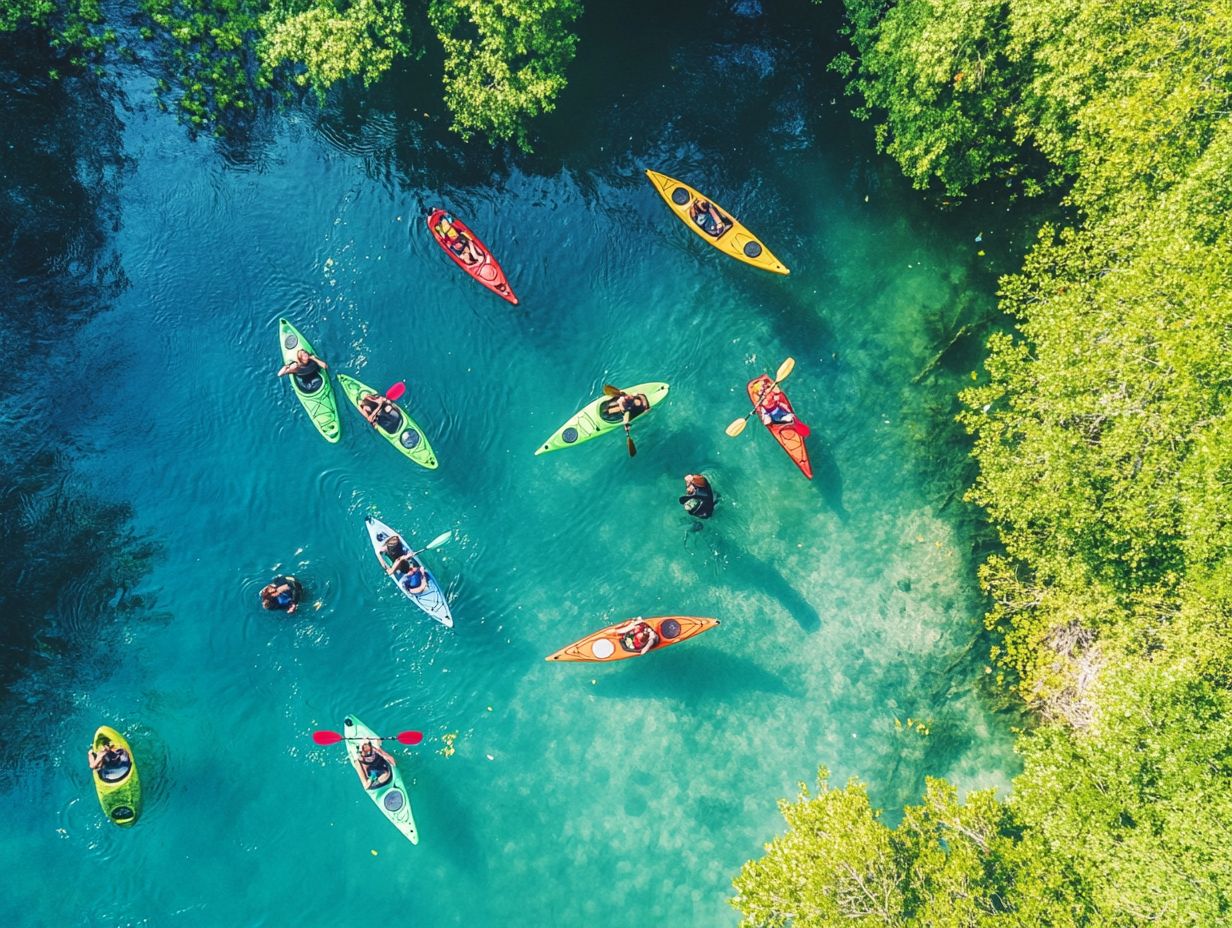
Numerous organizations and initiatives are committed to promoting eco-conscious water sports. They play a crucial role in conservation efforts and raising awareness about the environmental impact of recreational activities.
Collaborations with entities such as the German Federal Environment Agency establish regulations and guidelines that protect sensitive areas. This ensures that practices remain sustainable.
These dedicated groups strive to educate water sports enthusiasts like yourself on how to pursue your passions responsibly while safeguarding marine habitats.
Promoting Sustainable Practices and Conservation Efforts
Promoting sustainable practices in water sports is essential for cultivating a culture of conservation and environmental stewardship among enthusiasts like you.
Organizations play a pivotal role in this endeavor by providing educational programs that raise awareness about the importance of protecting aquatic ecosystems. These programs often feature workshops and seminars addressing crucial topics, such as pollution and the importance of variety in life within local waterways.
Many groups organize clean-up events, inviting you and other community members to join in the effort to remove debris from lakes and rivers. This direct engagement allows you to participate in meaningful conservation work. By following local regulations concerning wildlife protection and habitat preservation, these groups foster responsible behaviors that contribute to environmental sustainability.
Through these initiatives, organizations empower you to become a proactive guardian of your natural surroundings.
The Future of Eco-Conscious Water Sports
The future of eco-friendly water sports is thrilling, and you can be a part of it! You re joining a growing community of enthusiasts championing sustainable practices that minimize environmental impact.
As ecotourism continues to flourish, you ll find yourself drawn to destinations that prioritize the well-being of local ecosystems. This shift opens doors to a range of environmentally friendly activities like kayaking, stand-up paddleboarding, and windsurfing.
Engaging in these pursuits elevates your personal enjoyment and plays a vital role in advancing conservation efforts that safeguard marine habitats.
Potential for Growth and Impact
The rising interest in eco-conscious water sports offers you an extraordinary chance for economic growth and a positive environmental impact as more individuals seek out sustainable tourism experiences.
By embracing activities like kayaking, paddleboarding, and snorkeling that leave minimal ecological footprints, you can attract a growing number of tourists. This shift generates revenue for local businesses, creates jobs, and raises awareness about the significance of conserving marine ecosystems.
As water sports enthusiasts gravitate toward pristine environments, they contribute to the preservation of natural habitats while enjoying their adventures. This harmonious relationship between tourism and conservation can spark further investments in eco-friendly infrastructure, enhancing the enjoyment and sustainability of these water-based activities, ensuring they thrive for generations to come.
Frequently Asked Questions
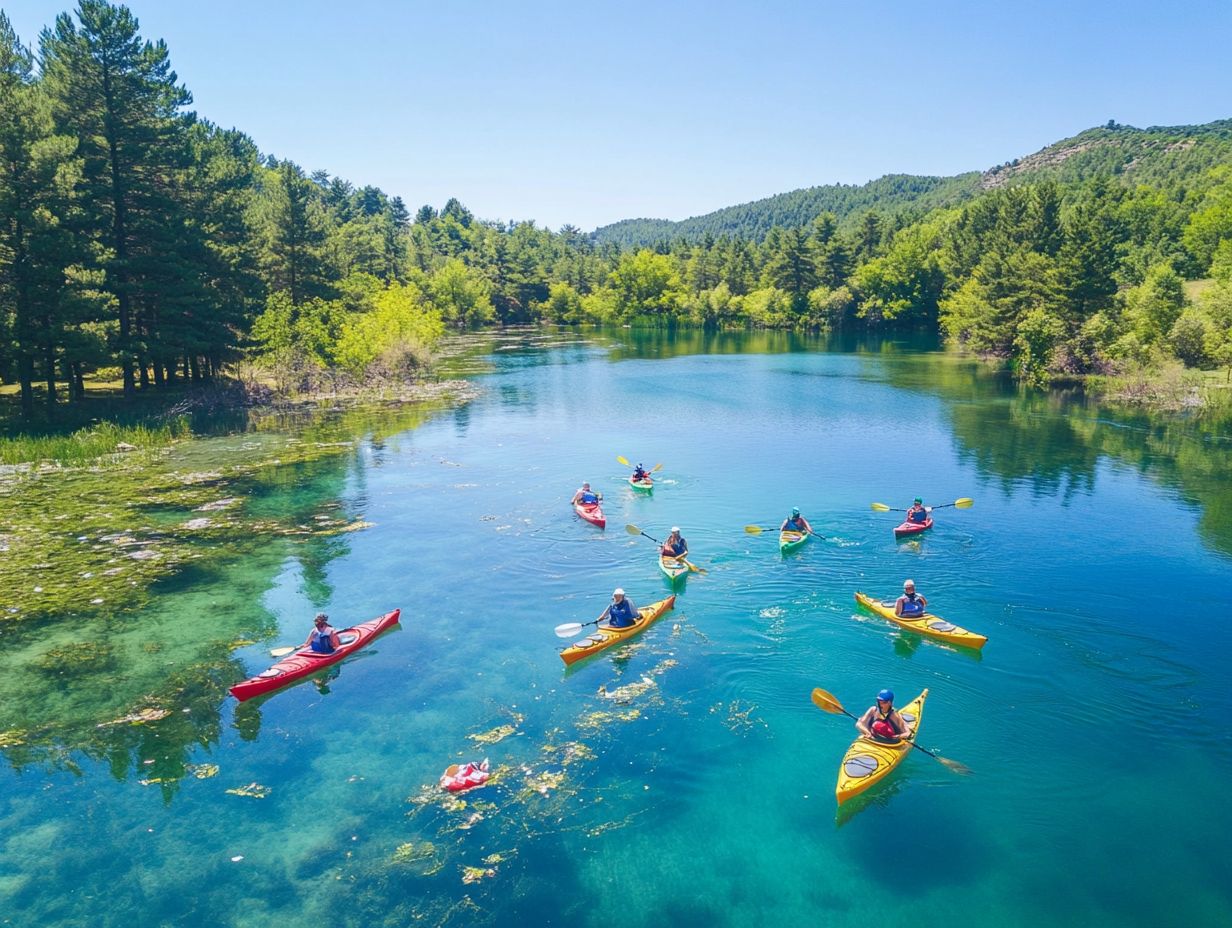
Below are some common questions about Kayaking with a Cause.
What is Kayaking with a Cause?
Kayaking with a Cause is a movement that combines the popular sport of kayaking with a commitment to environmental conservation and sustainability efforts.
Why is kayaking an eco-conscious water sport?
Kayaking is an eco-conscious water sport because it has minimal impact on the environment and allows for a non-intrusive way to explore and appreciate nature. It promotes a deeper understanding and appreciation for the importance of preserving our natural resources.
How can one participate in Kayaking with a Cause?
You can participate in Kayaking with a Cause by joining organized events, volunteering with environmental organizations, or practicing eco-friendly habits while kayaking independently.
What are some eco-conscious practices to follow while kayaking?
Some eco-conscious practices to follow while kayaking include using biodegradable sunscreen, packing reusable water bottles and snacks, properly disposing of waste, and avoiding disturbances to wildlife or sensitive ecosystems.
Can kayaking actually make a positive impact on the environment?
Yes, kayaking can make a positive impact on the environment. By participating in clean-up efforts, promoting eco-friendly habits, and supporting conservation organizations, kayakers contribute to a cleaner and healthier environment.
Are there any risks involved in kayaking with a cause?
Kayaking is an adventure that everyone can enjoy! While there are some risks, you can keep it safe and fun by following a few simple safety rules.
Be aware of any local regulations or guidelines for kayaking in specific areas.




